Table of contents
What is Prostate Cancer?
Prostate cancer is a type of cancer that affects the prostate, the walnut sized gland in a biological male below the bladder, where the seminal fluid is produced. This fluid is responsible for providing food to and transporting sperm. Genetic testing for prostate cancer can play an important role in assessing risk and creating a treatment plan after diagnosis.
Prostate cancer is one of the most common types of cancer. According to the CDC, out of every 100 men in the United States, about 13 will get prostate cancer during their lifetime, and about 2 to 3 men will die from the disease. The greatest risk factor of developing the condition is older age. African American men and those with a family history may be at an increased risk.

The growth of prostate cancer is usually slow and is detected before it spreads beyond the prostate gland. Localized prostate cancer cases can remain benign for decades so it is possible to live with prostate cancer without realizing it. In this case, treatment may involve watching for changes.
However, some subtypes may grow fast and spread aggressively. Men with metastatic prostate cancer may require more involved therapies immediately to treat this type of cancer.
In its early stages, prostate cancer can be difficult to detect. In later stages, a person suffering from prostate cancer may begin to find urinating difficult and see blood in their urine and semen. They may also experience erectile dysfunction and lose weight unexplainably. The Gleason score is the most commonly used grading system for prostate cancer diagnosis. The score is based on to what extent cancer cells look like healthy cells under a microscope. Less aggressive cancer types will look more like healthy cells and receive a lower Gleason score.
Screening tests are carried out in an effort to catch the disease in its early stages. However, there is controversy as to whether early screening in men who have no symptoms is beneficial enough to outway the risks. Most health care professionals will start discussing the role of prostate cancer screening with men in their 50s. Some of these tests include digital rectal examination and prostate specific antigen (PSA) blood test.
If the person is suspected to have prostate cancer, a biopsy is carried out to confirm the presence of the disease. Genetic testing can also play an important role in diagnosing prostate cancer. It has been discovered that some of the genes which cause genetic cancer can be inherited, therefore genetic testing can help alert a person who is at risk so they can get tested and treated.
Why Genetic Testing For Prostate Cancer?
Studies have revealed several inheritable genes which are associated with prostate cancer. Getting whole-genome sequencing through a company like Nebula Genomics can help you discover how high your risk of developing prostate cancer is. Some of the gene mutations associated with prostate cancer are on the MLPH, BRCA1 and BRCA2, CHEK2, and TP53 genes.
About 10% of men are at risk of being diagnosed with prostate cancer. However, men with family members who have prostate cancer are 20% likely to develop it. If the family member is in the immediate family, such as a father or a brother, the risk increases to about 50%. Genes that are suspected to be linked with prostate cancer have a 50% chance of being passed on to the next generation.
Genetic testing for prostate cancer has other benefits aside from early diagnosis. After genome sequencing, if a person is found to carry gene variants that are associated with prostate cancer, it can help other family members decide to get tested too. Genetic counselors can help review the results of genetic testing once performed.

Risk assessment is not the only area where genetic testing for prostate cancer is useful. It can also be useful in the treatment. Hereditary prostate cancer, which is the term for prostate cancer caused by inherited genes, tends to occur at an earlier age than other types. It also has a higher chance of spreading to other parts of the body. Because of this, men who have relatives who were diagnosed before the age of 50 are usually encouraged to talk with their doctors about screening and genetic testing.
Genetic testing helps you determine if your prostate cancer is hereditary or not and then helps the specialists make more informed decisions on treatment.
Genetic research is also helping with the nearly 600 clinical trials designed to help create better treatments.
Genetic Testing For Prostate Cancer
Myriad Genetics genetic testing for prostate cancer
This genetic testing company offers genetic testing for prostate cancer. Myriad Genetics has been selling genetic testing services for over 25 years and is constantly making efforts to bring the significance of genetics in diseases to the attention of both patients and medical practitioners. Myriad Genetics has carried out various studies to link genetics with various diseases to improve the process of diagnosis and treatment of diseases.
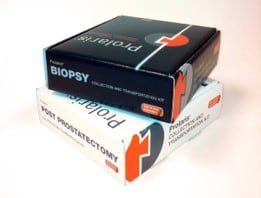
Myriad’s gene testing procedure for prostate cancer is called Prolaris. Prolaris costs $2400 per test. The company notes that most insurance companies will cover the entire cost of the test. For those with out-of-pocket costs, the price is usually less than $60.
Prolaris offers both tumor testing for confirmed tumors and genetic testing to identify if you have inherited a genetic mutation that increases your risk of developing cancer.
Prolaris, in combination with other screening tests, can be used to assess the aggressiveness of prostate cancer and the chances it will spread to other parts of the body. This product is designed for men with untreated cancer. It can also be used to aid in treatment decisions, such as choosing active surveillance or a multi-model aggressive treatment.
The tumor test can be used to estimate the growth of the cancerous cells in an individual for up to 10 years, allowing the healthcare professional to create a personalized treatment plan. It can also be used to test prostate cancer patients who have undergone surgery for the probability of recurrence of the cancer.
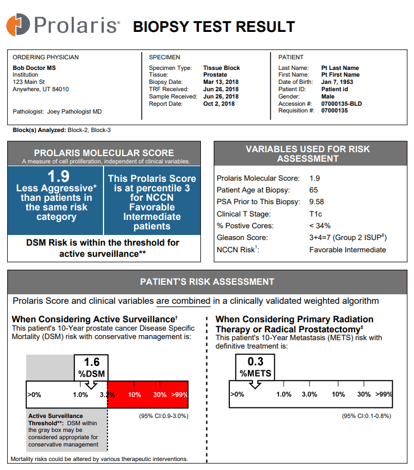
The genetic testing portion of Prolaris is for men with prostate cancer, treated or untreated. It assesses whether an inherited mutation may have caused your cancer. It can impact early treatment decision making and qualify individuals for certain treatments.
Myriad tests must be ordered through a doctor’s office.
Decipher Biosciences genetic testing for prostate cancer
This genetics company also offers testing for prostate cancer. Decipher Biosciences aims to improve the treatment of cancer patients with the aid of genetic testing and genetic information. Decipher’s prostate cancer testing helps physicians make the decision on which type of treatment should be used on a patient based on the severity of the patient’s prostate cancer disease.
Decipher prostate cancer test encompasses seven different cancer channels to make sure that the test is as accurate as possible. These channels are androgen signaling, angiogenesis, growth and differentiation, mine activity and response, invasion and metastasis, metabolism, and proliferation, and cell death. There are two different decipher tests for prostate cancer patients.
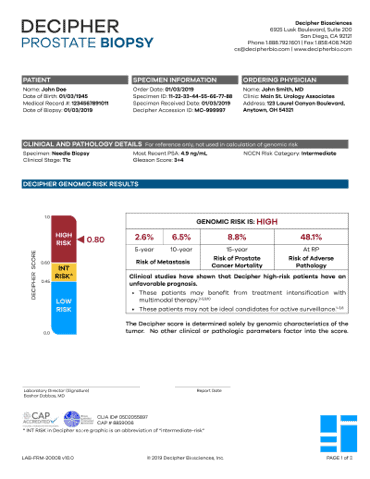
The first one which is the decipher prostate biopsy test helps the physician decide the best treatment for a patient with prostate cancer. The second test is the Decipher prostate RP test which is carried out on a patient who has undergone surgery to determine the frequency of treatment or if further treatment is going to be necessary. Decipher tests are covered by many health insurance plans. A Decipher Prostate test costs between $5,000 and $6,000.
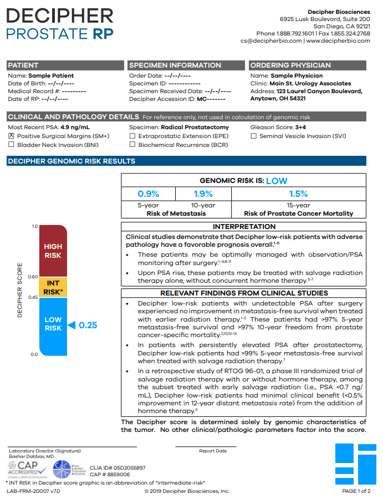
Oncotype IQ genetic testing for prostate cancer
Oncotype IQ’s genetic test results have been used in the diagnosis and treatment of over a million patients in more than 90 countries. Oncotype’s commits to help physicians make treatment choices based on an individual’s condition and not just guess what kind of treatment is necessary for the patient. Oncotype IQ is best known for their Oncotype DX Breast Recurrence Score test which helps to predict the efficacy of chemotherapy and also if the cancer will recur after surgery.

The Oncotype DX Genomic Prostate Score Test is useful for helping to decide the best course of treatment for patients with prostate cancer. This genetic test is usually carried out after an individual has been diagnosed with the condition.
The test helps the physician decide if further observation is required, or if surgery or radiation treatment is the next line of action. This test can provide this information by observing up to 17 genes that are connected to the development of prostate cancer in the human body.
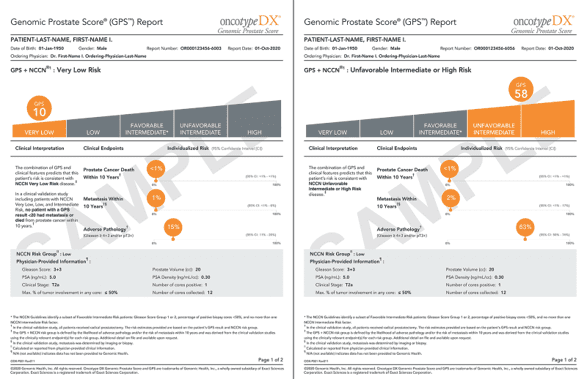
Nebula Genomics
Nebula Genomics is a genetic testing company that is dedicated to making personalized 30x whole genome sequencing available at a reasonable price to as many people as possible. This drive is fueled by the passion of the founder, Professor George Church whose work and research on DNA testing has led to several breakthroughs in the field.
These breakthroughs have then been made available to people all over the world. Research on gene sequencing continues to uncover relationships between genetics and both common and rare diseases, including prostate cancer. Unlike other consumer genetic testing services which only decode 0.01% of your DNA, Nebula Genomics whole genome sequencing kits can reveal 100%.
With this data, customers can ask virtually any question and unlock information on their susceptibility to certain diseases. As more research is conducted, Nebula provides weekly updates with new reports based on the most recent research.
Nebula Genomics whole-genome sequencing can examine over 250 variants linked to prostate cancer and use the information collated to give an estimate of the likelihood of an individual to develop prostate cancer. There are three options for the Nebula Genomics whole-genome sequencing kit. A basic option that costs $99 and gives you information on your ancestry as well as susceptibility to common diseases.
The next option is the deep kit which is available for $299 and will provide the best value for most people. The deep kit provides you with information on your risk to both common and rare diseases in addition to an understanding of your ancestry.
If you liked this article, you should check out the other posts in the Genetic Cancer Testing series and explore the Nebula Research Library to learn about hundreds of other conditions influenced by genetics, including many cancers.
Hereditary cancers include:
- Colon Cancer Genetic Testing
- Pancreatic Cancer Genetic Testing
- Genetic Testing for Breast Cancer
- Ovarian Cancer Genetic Testing
- Lung Cancer Genetic Testing
- Genetic Testing for Thyroid Cancer
Get your genome sequenced to receive personalized reports on all these conditions today!
October 14, 2021
Edited by: Christina Swords, Ph.D.
